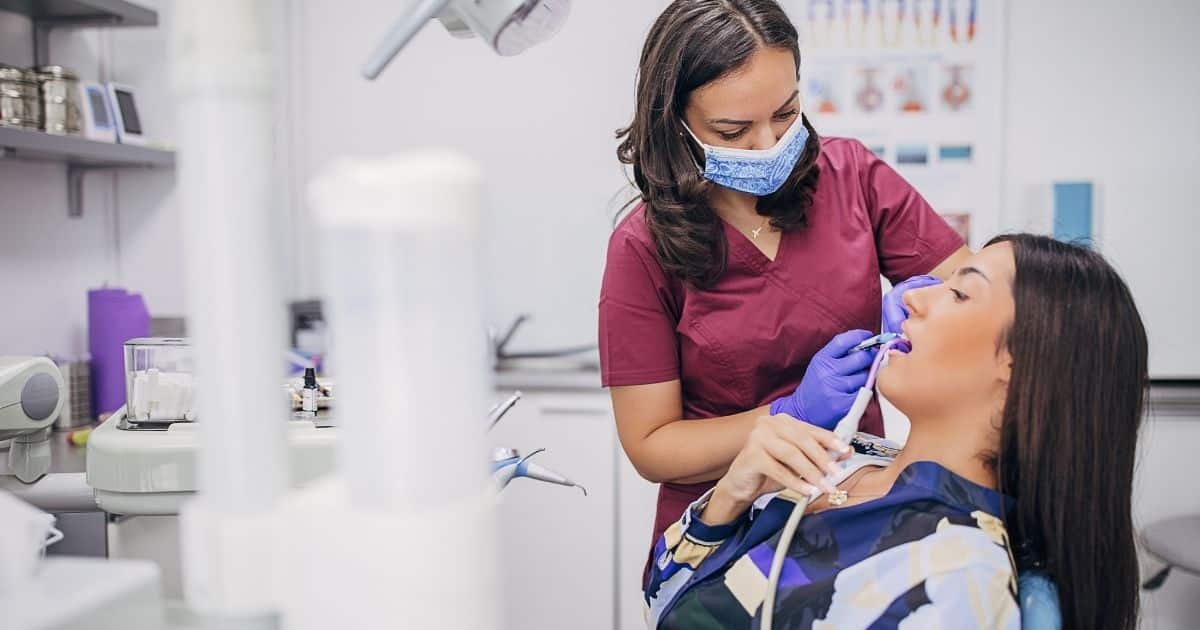Published on February 3, 2025

Bad breath, or halitosis, is a common problem that affects many people. It can be embarrassing and even impact confidence in social situations. While mouthwash and mints may provide temporary relief, they do not address the root cause. One of the best ways to prevent bad breath is through regular dental cleanings. Professional cleanings remove plaque, tartar, and bacteria that contribute to foul odors. They also help maintain overall oral health, reducing the chances of gum disease and decay.
What Causes Bad Breath?
Bad breath happens when bacteria build up in the mouth. Several factors contribute to this issue:
- Plaque and tartar – Sticky plaque forms on teeth daily. If not removed, it hardens into tartar, trapping bacteria that produce bad odors.
- Food particles – Leftover food between teeth and on the tongue can break down and create an unpleasant smell.
- Gum disease – Infected gums release toxins that cause persistent bad breath.
- Dry mouth – Saliva helps wash away bacteria. A dry mouth allows them to thrive, leading to bad breath.
- Certain foods and habits – Garlic, onions, smoking, and alcohol can all contribute to unpleasant breath.
How Dental Cleanings Help Freshen Breath?
Routine dental cleanings in Chester are essential for preventing bad breath. Here’s how they make a difference:
1. Removes Plaque and Tartar
Plaque builds up on teeth every day. Brushing and flossing help, but they can’t reach every spot. Over time, plaque hardens into tartar, which traps bacteria. This bacteria releases sulfur compounds, causing bad breath.
A professional cleaning removes both plaque and tartar, reducing odor-causing bacteria. Dental tools can reach areas that are difficult to clean at home, ensuring a fresh and healthy mouth.
2. Cleans Below the Gumline
Bacteria often hide beneath the gumline. When plaque collects there, it can lead to gum disease. Inflamed gums release foul-smelling toxins that contribute to bad breath.
A deep cleaning removes bacteria from below the gumline. This prevents infection, reduces inflammation, and improves breath. Regular visits to the dentist help keep the gums healthy and odor-free.
3. Prevents Cavities and Decay
Tooth decay is another cause of bad breath. When cavities form, bacteria settle inside, producing an unpleasant smell. Without treatment, decay worsens, making the odor stronger.
Dental cleanings help prevent cavities by removing the plaque that leads to decay. This keeps teeth strong and breath fresh. If a cavity is already present, the dentist can recommend treatment before it causes bigger problems.
4. Reduces Dry Mouth Issues
Saliva plays a crucial role in maintaining fresh breath. It washes away food particles and bacteria. When saliva production decreases, the mouth becomes dry, creating an ideal environment for bacteria to grow.
During a cleaning, the dentist can identify signs of dry mouth and suggest solutions. Drinking more water, chewing sugar-free gum, or using a saliva substitute can help keep the mouth moist and reduce bad breath.
5. Detects and Treats Gum Disease
Gum disease is a major cause of chronic bad breath. Early signs include red, swollen gums and bleeding while brushing. If left untreated, it can lead to receding gums and even tooth loss.
Dental cleanings help prevent gum disease by removing bacteria before they cause infection. If gum disease has already started, regular cleanings and treatments can control it. Healthier gums mean fresher breath.
6. Cleans the Tongue and Other Hard-to-Reach Areas
Bacteria do not just settle on teeth—they also live on the tongue and other surfaces in the mouth. A dental cleaning removes buildup from these areas, preventing bad breath from lingering.
Dentists often recommend tongue scrapers or special brushes to help maintain freshness between visits. Keeping the entire mouth clean is key to preventing odors.
How Often Should You Get a Dental Cleaning?
For most people, dental cleanings should happen every six months. However, some may need more frequent visits, especially if they have gum disease, dry mouth, or a history of cavities.
In between cleanings, maintaining good oral hygiene is essential. This includes:
- Brushing twice a day with fluoride toothpaste
- Flossing daily to remove food and plaque
- Using mouthwash to kill bacteria
- Drinking plenty of water to keep the mouth hydrated
Other Tips to Prevent Bad Breath
Along with regular cleanings, these habits can help maintain fresh breath:
- Eat a balanced diet – Avoid too many sugary or acidic foods that feed bacteria.
- Quit smoking – Tobacco products contribute to bad breath and gum disease.
- Replace your toothbrush – Use a new toothbrush every three months for effective cleaning.
- Scrape your tongue – Bacteria collect on the tongue, so cleaning it daily helps reduce odors.
Bad breath can be frustrating, but professional dental cleanings make a big difference. They remove plaque, prevent gum disease, and help keep the mouth fresh. Combined with good daily habits, regular cleanings are one of the best ways to ensure lasting oral health and fresh breath.
